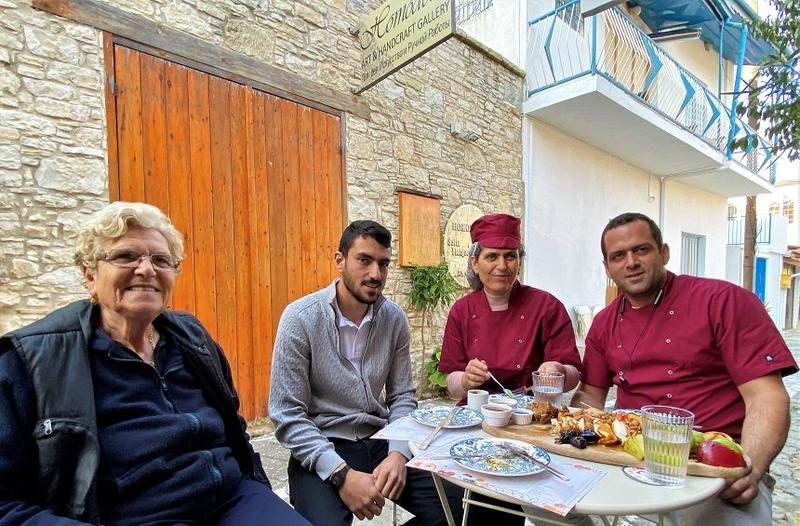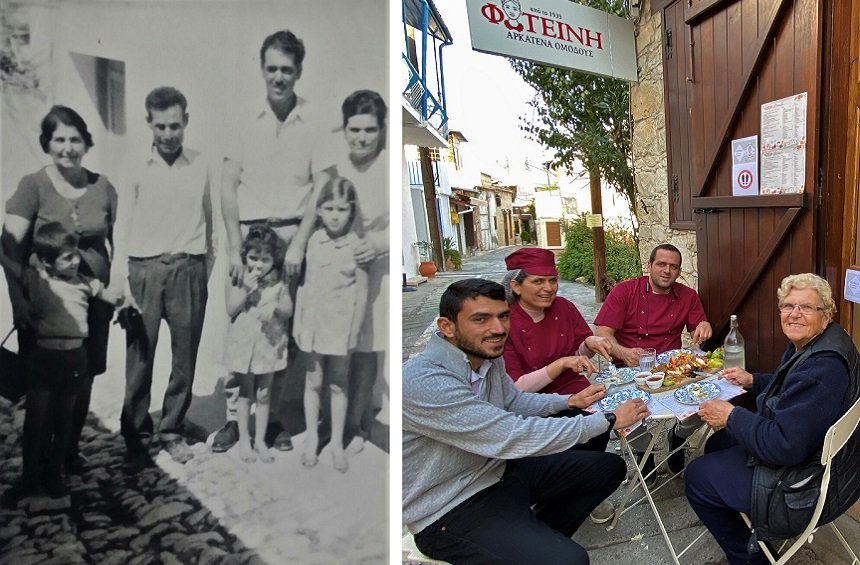
Fotini belongs to a generation that grew up working, whether learning a particular craft from a craftsman, or helping their parents at home or in the family business. A grandmother now, Fotini remembers how she undertook the kneading of the bread at home from the age of 8. Since then, for almost 70 years, her equipment and oven have been her constant companions.

Fotini’s name has become synonymous with one of the most well-known handicrafts of Omodos, the delicious Arkateno bread, the recipe of which is an element of intangible cultural heritage, recognized by UNESCO. Most importantly, Fotini has passed on the craft she learned from her mother, Eleni, to her daughter, Stavroulla, and her grandchildren.
Not all the women of the village knew how to make ‘arkati,’ which is the base of the bread made with the foam from fermented chickpeas. Usually this skill was the property of one family.
“My father would take my mother’s bread to Platres, which had a large population at the time, as well as to Nicosia,” remembers Fotini. As she had taken on the responsibility of kneading the bread from a very young age, she had to wake up much earlier than her peers, in order to get the bread out of the way before setting off for school. Her daughter, Stavroulla, became used to this same schedule, as the preparation of the bread always begins at around 3-4 in the morning.
Stavroulla, having grown up with the characteristic, sweet taste of arkateno, soon took over the third generation of this family craft. “From a young age, I enjoyed helping my mother knead the bread,” she says with a smile, confirming that the early mornings were not a painful experience for her. When she got her first job, she would often return home disappointed with what she was doing, and with her working conditions.
Rather than see her daughter unhappy in such a situation, Fotini officially assigned a large part of the ‘Arkatena Fotoni’ business to her.
Stavroulla added her own touch to this craft, as she liked to experiment with new flavors in the kitchen and explore the creative possibilities of this traditional recipe. Mother and daughter’s dedication to this craft inevitably had an impact on the younger generation as well.

Then and now.
“I raised my children in the ovens,” says Stavroulla, whose family is now almost entirely engaged in this village handicraft.
Though Stavroulla’s children grew up in an age where young people seek out career opportunities in big cities while pursuing the pleasures of cosmopolitan living, the love that was instilled in them for their village and for arkatena has helped overturn this pattern.

On the left, Fotini as a young woman who raised her family by baking arkateno, on the right Fotini as a grandmother, next to the grandsons that are now taking over.
Andreas, the eldest son of Stavroula, soon recognized that the family business is a treasure that still has much to offer, both to themselves as well as to the community. With his brother Yiannis as his main collaborator, as well as Stavroulla and grandmother Fotini as the main pillars of this family craft, they have turned arketena into the ultimate Cypriot brunch. After all, for this family, the sweet taste of arkatena has been the best way to start the day for decades.